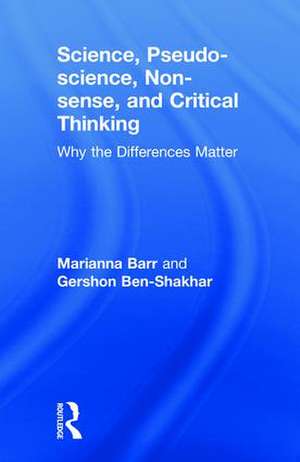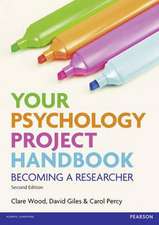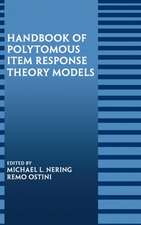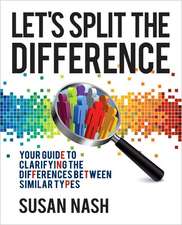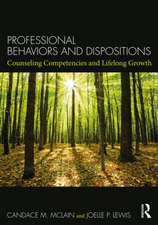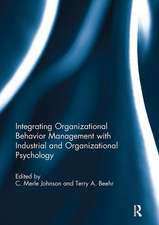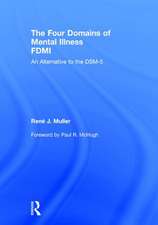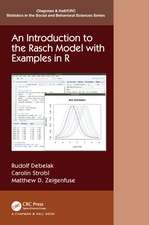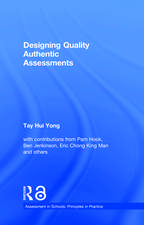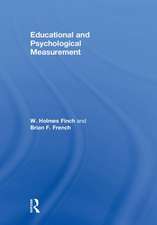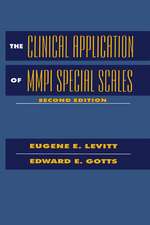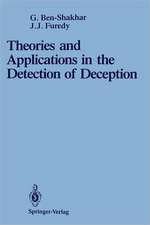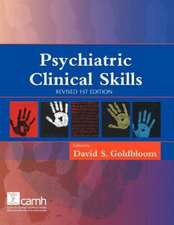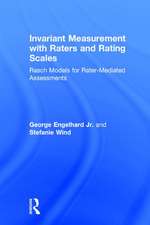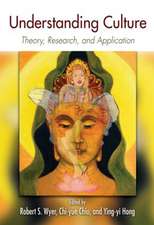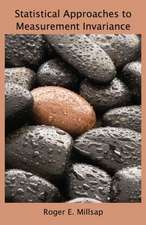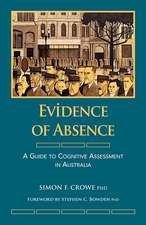Science, Pseudo-science, Non-sense, and Critical Thinking: Why the Differences Matter
Autor Gershon Ben-Shakhar, Marianna Barren Limba Engleză Hardback – 27 noi 2018
Adopting a scientific approach, the book critically evaluates research into cold-reading practices, such as those that claim to be able to communicate with the afterlife or posess supernatural powers, before considering a range of pseudo-sciences including graphology and polygraph interrogation, exposing the pretensions of these practices in a clear and logical fashion. The book seeks to encourage critical thinking throughout, asking whether there is any scientific evidence to support these practitioners’ abilities to supply us with reliable answers, and discussing the various factors that comprise the psychological mechanism of belief.
Written in a fluent and accessible style, Science, Pseudo-science, Non-sense, and Critical Thinking is aimed at interested professionals and the public at large.
| Toate formatele și edițiile | Preț | Express |
|---|---|---|
| Paperback (1) | 233.03 lei 6-8 săpt. | |
| Taylor & Francis – 29 noi 2018 | 233.03 lei 6-8 săpt. | |
| Hardback (1) | 680.73 lei 6-8 săpt. | |
| Taylor & Francis – 27 noi 2018 | 680.73 lei 6-8 săpt. |
Preț: 680.73 lei
Preț vechi: 914.36 lei
-26% Nou
Puncte Express: 1021
Preț estimativ în valută:
130.25€ • 135.100$ • 107.80£
130.25€ • 135.100$ • 107.80£
Carte tipărită la comandă
Livrare economică 04-18 aprilie
Preluare comenzi: 021 569.72.76
Specificații
ISBN-13: 9781138300767
ISBN-10: 1138300764
Pagini: 164
Dimensiuni: 129 x 198 mm
Greutate: 0.45 kg
Ediția:1
Editura: Taylor & Francis
Colecția Routledge
Locul publicării:Oxford, United Kingdom
ISBN-10: 1138300764
Pagini: 164
Dimensiuni: 129 x 198 mm
Greutate: 0.45 kg
Ediția:1
Editura: Taylor & Francis
Colecția Routledge
Locul publicării:Oxford, United Kingdom
Public țintă
General, Professional, and Professional Practice & DevelopmentCuprins
Preface
Acknowledgments
Introduction
Chapter One
You Have Great Unfulfilled Potential: Cold (Psychic) Reading
What is Cold Reading?
Tarot Cards
Cold Reading and Psychological Science
How does it Work?
Why does it Work?
How Much Does it Cost?
Bibliography
Chapter Two
"They Love you and you know that": Astrology
An Overview of Astrology
Astrology and Science
Bibliography
Chapter Three
Show me your handwriting and I’ll tell you who you are: Graphology
Science and Pseudo-Science
History of Graphology
The Use of Graphology
Is Handwriting Truly a Mirror of our Personality?
The Validity of Graphology
Bibliography
Chapter Four
Pinocchio’s Nose: The Truth behind the Lie-Detector
Oops, an Innocent Man has been condemned to Life Imprisonment
Lying, Honesty and the Desire to Tell them Apart
The Truth will out: A Brief History of the Polygraph
The Relevant/Irrelevant Question Test (R/I)
The Control (Comparison) Question Test (CQT)
The Direct Lie Test (DLT)
The Concealed Information Test (CIT)
The CQT versus the CIT – where is the Scientific Basis?
Accuracy of the CQT versus the CIT
The Use of the Polygraph in Screening and Classification Processes
The Use of the Integrity Test as an Alternative to the CQT
Bibliography
Chapter Five
"Since Man Cannot Live without Miracles, he will Provide Himself with Miracles of his Own Making": The belief in Practices based on Cold Reading, Mysticism, and Pseudo-Science
The Need to Believe
Abuse of the need to believe
Popular Beliefs
Bias in Human Judgment
The Clients’ Belief
The Burden of Doubt and Incertitude
The Need to Remove Personal Responsibility
The Influence of the Barnum Effect
Bias for Positive Evidence
Social and Cultural Influences (Conformity)
Shifting the Burden of Proof
The Practitioners’ Belief
The Confirmation Bias
Illusory Validity
Bibliography
A Final Word
Acknowledgments
Introduction
Chapter One
You Have Great Unfulfilled Potential: Cold (Psychic) Reading
What is Cold Reading?
Tarot Cards
Cold Reading and Psychological Science
How does it Work?
Why does it Work?
How Much Does it Cost?
Bibliography
Chapter Two
"They Love you and you know that": Astrology
An Overview of Astrology
Astrology and Science
Bibliography
Chapter Three
Show me your handwriting and I’ll tell you who you are: Graphology
Science and Pseudo-Science
History of Graphology
The Use of Graphology
Is Handwriting Truly a Mirror of our Personality?
The Validity of Graphology
Bibliography
Chapter Four
Pinocchio’s Nose: The Truth behind the Lie-Detector
Oops, an Innocent Man has been condemned to Life Imprisonment
Lying, Honesty and the Desire to Tell them Apart
The Truth will out: A Brief History of the Polygraph
The Relevant/Irrelevant Question Test (R/I)
The Control (Comparison) Question Test (CQT)
The Direct Lie Test (DLT)
The Concealed Information Test (CIT)
The CQT versus the CIT – where is the Scientific Basis?
Accuracy of the CQT versus the CIT
The Use of the Polygraph in Screening and Classification Processes
The Use of the Integrity Test as an Alternative to the CQT
Bibliography
Chapter Five
"Since Man Cannot Live without Miracles, he will Provide Himself with Miracles of his Own Making": The belief in Practices based on Cold Reading, Mysticism, and Pseudo-Science
The Need to Believe
Abuse of the need to believe
Popular Beliefs
Bias in Human Judgment
The Clients’ Belief
The Burden of Doubt and Incertitude
The Need to Remove Personal Responsibility
The Influence of the Barnum Effect
Bias for Positive Evidence
Social and Cultural Influences (Conformity)
Shifting the Burden of Proof
The Practitioners’ Belief
The Confirmation Bias
Illusory Validity
Bibliography
A Final Word
Notă biografică
Gershon Ben-Shakhar is a Professor Emeritus in the Department of Psychology, Hebrew University of Jerusalem, and a leading expert in the psychophysiological detection of deception.
Marianna Barr studied English and Comparative Literature. She has written and translated poetry as well as translated numerous theoretical books, essays, and short stories.
Marianna Barr studied English and Comparative Literature. She has written and translated poetry as well as translated numerous theoretical books, essays, and short stories.
Recenzii
"In our post-modern era in which the distinction between truth and fiction is increasingly blurred and practices offering quick solutions are more popular than ever, Science, Pseudo-science, Non-sense, and Critical Thinking is a must read. In accessible and often humorous language, Barr and Ben-Shakhar debunk practices based on mysticism and pseudoscience, offer illuminating insights into our beliefs, and demonstrate the promise of critical thinking. Reading this book was sheer pleasure. I will recommend it to all my students because critical thinking is important not just for science, it is important for our everyday life." - Ram Frost, Professor of Psychology, The Hebrew University of Jerusalem, Israel
Descriere
An authoritative but engaging examination of the practices of graphology, lie detection, and "cold reading" techniques which exposes their fragile and unscientific basis and considers the question of why so many people continue to believe in their worth and validity.
